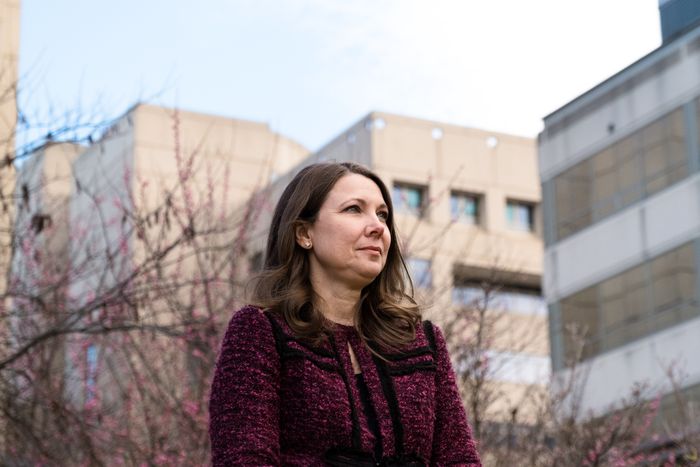Triaging who is eligible for Covid-19 tests can help ensure that patients who need a test the most get results fast enough to isolate or get treatment, pathologists and public-health experts say. The strategy, however, risks perpetuating the virus’s spread if some people get turned away from testing altogether.
“What we don’t want is for people to not be able to get tested in the community and then show up at the ER to get testing,” said Melissa Miller, director of the University of North Carolina’s microbiology lab. “But there is a maximum amount that you can collect in a day.”

Melissa Miller, director of the University of North Carolina’s microbiology lab.
UNC is restricting tests to people with Covid-19 symptoms, employees and patients who need a test before surgeries. Dr. Miller said UNC is running about 1,200 tests a day and returning results to patients within 24 hours. About a third of the tests are coming back positive, she said.
The University of Washington temporarily closed some of its testing sites on Tuesday and is giving appointment priority to people with Covid-19 symptoms or a known exposure. The turnaround time for test results had stretched past two days, beyond the university’s 24-hour goal, said Geoffrey Baird, UW Medicine’s acting chair of Laboratory Medicine and Pathology, at a Dec. 30 media briefing.
“A Covid test that is not back for several days, it just isn’t terribly meaningful because someone could go on and spread the virus,” Dr. Baird said.
Dr. Baird also said the proportion of test results coming back positive is too high to take advantage of a common resource-saving technique. UW Medicine often uses a single test on multiple patient samples at once, a process called pooling, which saves time and resources when most samples are negative. But pooling doesn’t work if too many samples are positive because lab workers often have to retest the batches to find the positive results.
For pooling to be effective, the positivity rate needs to be as low as 10% to 15%, Dr. Baird said. At UW Medicine, the overall positivity rate was about 25%, with some sites exceeding 40%, around Dec. 30 and continues to increase. “We can’t do pooling anymore, and what it does is it really decreases our capacity,” Dr. Baird said.

UNC is running about 1,200 tests a day and about a third of the tests are coming back positive.

Results are returned to patients within 24 hours.
The Carle Foundation Hospital Laboratory in Illinois ran about 13,000 Covid-19 PCR tests within the week ending Jan. 1, up from about 6,700 at the beginning of November. The lab could run around 18,000 tests a week if it had enough staff and supplies, said Bruce Wellman, a pathologist. The lab recognizes it could need a triage strategy for its drive-through sites if demand outpaces capacity, Dr. Wellman said.
“We’ve got the choice of delayed results, which have no value, versus timely, immediate results, which do have value,” he said.
Even before the Omicron wave put many people out sick or into quarantine, laboratories were chronically understaffed and heading into their third year of pandemic operations.
“There are a finite number of people who do laboratory testing. It’s not an endless resource,” said Emily Volk, president of the College of American Pathologists.
Dr. Volk said that staff at Baptist Health Floyd in Indiana, where she is chief medical officer, worked over the holidays to process tests and that processing time for samples remained low. Many hospital and commercial labs are running around the clock, with staff there to process samples at all hours.

UNC is restricting tests to people with Covid-19 symptoms, employees and patients who need a test before surgeries.
Testing materials including reagents and swabs are more readily available than earlier in the pandemic, Dr. Volk and other diagnostic experts said. But some labs have started to report challenges in getting materials in recent days because of increased demand.
Laboratories in the U.S. were processing about 1.7 million Covid-19 tests a day as of Jan. 3, according to federal data, comparable to the number processed during last winter’s surge.
Many mass-testing sites were closed or converted into vaccination sites within the past year. Fewer locations and staff for collecting samples have contributed to hourslong lines and limited testing appointments across the country.

Laboratories are heading into their third year of pandemic operations.
Some states and cities have established new sites in recent weeks and federal officials said last week that they would add locations in several states and Washington, D.C. The Centers for Disease Control and Prevention said laboratories that can help collect samples or conduct drive-through testing should contact local health officials.
Some laboratories say they are still processing PCR tests in one to two days, including Laboratory Corp. of America Holdings. Quest Diagnostics Inc. on Tuesday said it expected turnaround times of two to three days, up from a day. The company is using its own air fleet and logistics network to balance sample volume across two dozen Covid-19 testing labs and is sending some excess samples to external laboratories.
SHARE YOUR THOUGHTS
How long do you have to wait to get Covid-19 test results? Join the conversation below.
CityMD, which operates urgent-care centers throughout New York and New Jersey, said it is averaging five to seven days to deliver PCR test results and has temporarily closed more than 30 of its 150 locations because of staffing concerns. CityMD said it plans to reopen 12 sites on Monday and then more on Jan. 17, contingent on availability of workers.
Over-the-counter, at-home tests have helped ease pressure on laboratories, but they have been in short supply. The Indiana Department of Health said Tuesday that rapid tests at state and local sites would only be available to people under age 18 or symptomatic adults 50 and older as a result of high demand and a national shortage. PCR tests are still available at all sites, the department said, with results expected in two to three days.
Write to Brianna Abbott at [email protected]
Copyright ©2022 Dow Jones & Company, Inc. All Rights Reserved. 87990cbe856818d5eddac44c7b1cdeb8







